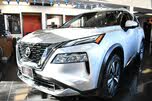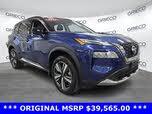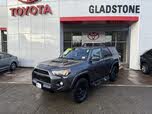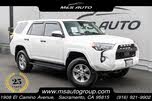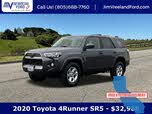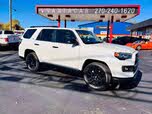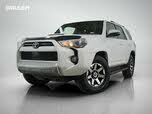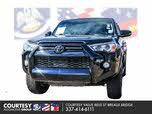2021 Nissan Rogue vs 2020 Toyota 4Runner
Overview | ||
MSRP | $36,120 | $26,050 |
Average price | $37,309 | $22,012 |
Listings | ||
Ratings & Reviews | ||
User reviews | ||
Expert reviews | 6.8 out of 10Read full review | 9.0 out of 10Read full review |
Pros & cons | Pros
| Pros
|
Summary | Even in its expensive Limited trim, the Toyota 4Runner remains clearly purpose-built for tackling terrain. Whether on a dusty cow path or snowy mountain road, the 4Runner looks most in its element when its outside the typical car’s comfort zone. For 2020, Toyota keeps enough chrome and leather available to market the 4Runner as a rough-and-tumble luxury alternative, but shoppers considering one had better have a real need for 4-wheel drive. | To characterize the all-new 2021 Nissan Rogue as vital to the automaker's success is an understatement. Not only is the compact crossover SUV the best-selling Nissan in America, but it's also one of the best-selling vehicles in America. Strip out pickup trucks, and the Rogue sits near the top of the U.S. sales chart with its primary competitors, the Honda CR-V and Toyota RAV4. Imagine the pressure on Nissan designers, engineers, and product planners as they prepared the current Rogue's replacement! The good news is that the new Rogue is a better SUV in every way but one. |
Video | No video found | |
Popular Features & Specs | ||
Engine | 4.0L 270 hp V6 | 2.5L 181 hp I4 |
Drive Train | 4X2 | FWD |
Seating Capacity | 7 | 5 |
Horsepower | 270 hp @ 5600 rpm | 181 hp @ 6000 rpm |
MPG City | 16 | 27 |
MPG Highway | 19 | 35 |
Engine | ||
Engine Name | 4.0L 270 hp V6 | 2.5L 181 hp I4 |
Torque | 278 lb-ft @ 4400 rpm | 181 lb-ft @ 3600 rpm |
Horsepower | 270 hp @ 5600 rpm | 181 hp @ 6000 rpm |
Drivetrain | 4X2 | FWD |
Fuel Economy | ||
MPG City | 16 | 27 |
MPG Highway | 19 | 35 |
Interior | ||
Seating Capacity | 7 | 5 |
Safety | ||
Front Crash Overall | 4 | 3 |
Side Crash Overall | 5 | 5 |
Dimensions & Capacity | ||
Cargo Space | 47.2 cu ft | 31.6 cu ft |
Curb Weight | 4400 lbs | 3371 lbs |
Height | 71.5 in | 66.5 in |
Length | 190.2 in | 183.0 in |
Width | 75.8 in | 72.4 in |
Wheelbase | 109.8 in | 106.5 in |
Maximum Payload | 1700 lbs | 1115 lbs |
Number of doors | 4 | 4 |
Maximum Towing Capacity | 5000 lbs | |
Standard Towing Capacity | 5000 lbs | |
The 2020 Toyota 4Runner presented a bold and utilitarian design, making it stand out as a rugged SUV ready for off-road adventures. Boasting tall slab sides, a high beltline, short overhangs, and a near-vertical front fascia, this vehicle's appearance was timeless and reminiscent of the XJ Jeep Cherokee. The flared wheel wells were specifically designed to accommodate bulky off-road tires, and the short overhangs enabled the vehicle to tackle steep pitches and sharp declines effectively. Ironically, the hood scoop, a clear visual cue of the off-road-focused TRD trim, remained one of the few non-functional design elements.
The front fascia featured small, angular headlights, while most trims (except for the Limited and TRD Pro) had twin body-color bars crossing the grille. TRD Pro trims had blacked-out accents with “TOYOTA” emblazoned on the middle bar, and the Limited trim used bright chrome accents.
The trim lineup for the 2020 model included SR5, SR5 Premium, TRD Off-Road, TRD Off-Road Premium, TRD Pro, and Limited. The Nightshade Special Edition also returned, and a new Venture Special Edition debuted for 2020. The Nightshade and Venture Special Editions added a stealth aesthetic with plenty of blacked-out trim, and the Venture went the extra mile with 17-inch TRD wheels and a standard Yakima Megawarrior roof rack.
Our test model was the Limited trim, which focused on comfort over capability. Leather upholstery covered all the seats, though lower trims featured cloth, and the SR5 Premium and TRD Off-Road Premium versions opted for the sweat-trapping SofTex material. Regardless of the trim, an 8-inch touchscreen was centrally located within the dashboard. Despite chrome and leather touches, the 4Runner Limited still came across as utilitarian, with plenty of plastic elements and a seating position better suited for off-road trails than long highway trips.
Meanwhile, the 2021 Nissan Rogue embraced a more modern and technical appearance, making it look every bit the SUV it was meant to be. Dark gray plastic cladding enveloped the lower perimeter, adding ruggedness, while bold simulated skid plates and lower door protection conveyed an audacious rugged spirit—perhaps too boldly on the rear bumper.
The Rogue boasted clean LED lighting elements, a prominent V-Motion grille, and proper proportions, lending it a contemporary aesthetic. All trim levels came with aluminum wheels up to 19 inches in diameter, and an optional two-tone paint with a black roof treatment gave the SUV a custom look.
Nissan offered four versions of the Rogue: the base Rogue S, the popular Rogue SV, the slightly luxurious Rogue SL, and the premium Rogue Platinum, which featured semi-aniline quilted leather and upscale amenities. Our test vehicle, a Rogue SL with the Premium Package and additional equipment, had front-wheel drive and a total cost of $35,195.
The interior sported an Almond color leather interior and a standard panoramic glass sunroof, creating a light and spacious feel. Abundant soft-touch surfaces, appealing simulated wood trim, and fabric-wrapped windshield pillars added to the sense of quality. The Platinum trim took luxury a step further with quilted semi-aniline leather, contrast stitching, and ambient lighting. However, the climate control panel's old-fashioned digital clock appearance and the continued inclusion of a CD player were notable quirks in an otherwise modern interior.
Built on a truck chassis, the 2020 Toyota 4Runner offered a less complicated approach to engine and drivetrain options. Every trim, from the base-spec SR5 to the $50,000 TRD Pro, featured a 4-liter V6 engine coupled with a 5-speed automatic transmission, generating 270 horsepower and 278 pound-feet of torque. This engine was not known for its smoothness or efficiency, prioritizing reliability and durability instead, as evidenced by its 5,000-pound towing capacity and robust build.
However, potential buyers needed to contend with poor fuel economy, as the EPA estimated 16 mpg city, 19 highway, and 17 combined. Over a 400-plus mile test drive, the 4Runner achieved an average of 17.7 mpg. The 4Runner's value shone most brightly in off-road conditions. The body-on-frame construction gave it the ruggedness required to tackle rough and twisting terrains, although on-road handling left something to be desired. Significant body roll and heavy, vague steering made the 4Runner a challenge on asphalt.
The availability of both RWD and 4WD gave flexibility, although the latter, especially in the TRD models, fully utilized the vehicle's off-roading capabilities. The TRD versions came with advanced traction systems like Toyota’s CRAWL control and Multi-Terrain Select to help navigate tricky ground.
Conversely, the 2021 Nissan Rogue was powered by a direct-injected 2.5-liter four-cylinder engine producing 181 horsepower at 6,000 rpm and 181 pound-feet of torque at 3,600 rpm. This output sufficed for daily driving despite the SUV's nearly 3,500-pound mass. The continuously variable transmission (CVT) performed admirably, mimicking a traditional automatic with programmed ratios and paddle shifters.
Though adequate for urban and suburban driving, the Rogue could have used more power, especially for adventures into mountainous regions. Nissan hinted at a future turbocharged variant, possibly borrowing the variable-compression turbocharged 2.0-liter four-cylinder engine from the Altima and Infiniti QX50.
The Rogue’s driving dynamics could be enhanced by switching to Sport mode, while Eco mode aimed to improve fuel economy. In a mixed driving loop, the front-wheel-drive Rogue SL delivered 27.5 mpg, slightly below the EPA rating.
Nissan’s sophisticated tuning improved the Rogue's ride and handling. Its robust architecture comprised of 35% high-strength steel, brake-induced Intelligent Trace Control, Active Ride Control systems, and new Vehicle Motion Control—predictively adjusting responses based on driver inputs—made for a smooth and athletic ride. The electric-assist steering, relocated to the rack, provided dramatically improved steering feel over the previous generation.
The 2020 Toyota 4Runner, with its body-on-frame construction and impressive ground clearance, presented a tall seating position, providing clear outward visibility essential for off-road expeditions. Our Limited trim’s power-retractable running boards facilitated easier entry and exit, though shorter owners might still find frequent boarding and alighting tiring. Inside, large knobs for HVAC controls and smaller ones for stereo volume and tuning made it user-friendly. However, the steering wheel buttons lacked illumination, making them hard to comprehend in the dark.
One of the 4Runner’s key appeals was its optional third row in non-TRD and non-Venture trims. But the third-row seats were narrow, thin, and uncomfortable, designed for short, occasional use. The third-row seating mechanism, which folded the seatback towards the floor and slid the bottom cushions backward, compounded the legroom issue, making it inferior to spacious third rows found in competitors like the Subaru Ascent or the Chevrolet Traverse.
The 4Runner’s cargo capacity, despite the seating limitations, stood out at 46.3 cubic feet behind the second row (when the third row wasn't in use) and expanded to 88.8 cubic feet with the second row folded down, offering ample space for gear.
Meanwhile, the 2021 Nissan Rogue's interior design incorporated Zero Gravity seat designs, aiming to replicate the weightless position astronauts adopt in space. The seats, which varied in comfort based on trim levels, now presented a more comfortable experience. Manual driver’s height adjusters came standard in the S trim, while higher trims included power adjustments and upgraded upholstery options, with the Platinum featuring premium quilted leather.
Higher trims also offered Quick Comfort heated front seats, a heated steering wheel, and heated rear seats. Triple-zone climate control, standard in SL and Platinum trims, allowed rear-seat occupants to control their temperature. The rear seats provided ample headroom and legroom, and the rear doors, opening to nearly a 90-degree angle, facilitated easy loading and unloading of passengers. The Rogue also featured a rear-seat reminder system to prevent parents from leaving children in the vehicle inadvertently.
With improved storage solutions, the new electronic shifter freed up space under the center console, and door-panel pockets accommodated large water bottles. The power rear liftgate (hands-free in SL and Platinum trims) unveiled a cargo area offering 31.6 cubic feet in the S and SV, and up to 36.5 cubic feet in the SL and Platinum with the Divide-N-Hide cargo management system. With the rear seats folded down, the Rogue provided 74.1 cubic feet, making it one of the largest in its class.
Historically, the 4Runner lagged behind in technology, but the 2020 model included significant updates. The introduction of an 8-inch touchscreen infotainment system with Apple CarPlay and Android Auto compatibility brought it on par with modern expectations. Toyota’s factory system was relatively straightforward except the onboard navigation, which was less intuitive than smartphone projections like Google Maps. The 2020 4Runner featured Amazon Alexa, Bluetooth connectivity, and several subscription services like Sirius XM Radio, Safety Connect, and WiFi Connect. Higher trims included a JBL stereo system and onboard navigation. However, compared to competitors, the 4Runner’s technological advancements were still catching up, with simpler systems and smaller screens.
Nissan, conversely, equipped the 2021 Rogue with a competitive infotainment package tailored to modern needs. Even the base S trim included an 8-inch touchscreen display with Apple CarPlay, Android Auto, SiriusXM satellite radio, and Bluetooth. NissanConcierge Personal Assistant came with a six-month free trial. Higher trims (SV and SL) added NissanConnect Services, a WiFi hotspot, and integration with Amazon Alexa and Google Assistant. SL Premium and Platinum trims came with a larger 9-inch touchscreen, door-to-door navigation, wireless Apple CarPlay, upgraded voice recognition, and a Bose premium audio system. For ultimate tech-savvy buyers, the Platinum trim offered wireless smartphone charging, a 12.3-inch digital instrument cluster, and a 10.8-inch head-up display.
Bringing modern-day technology to the 2020 4Runner extended to safety enhancements, with Toyota Safety Sense P (TSS-P) suite included as standard. It featured adaptive cruise control, lane-departure alert, pre-collision system with pedestrian detection, and automatic high beams. Complementing these advanced safety features were eight standard airbags. The National Highway Traffic Safety Administration (NHTSA) rated the 2020 4Runner four out of five stars overall, with a three-star rating in the rollover test. The Insurance Institute for Highway Safety (IIHS) awarded it the highest rating of Good in most crash tests but rated it Marginal for the small overlap front: driver-side test.
In highway driving, the adaptive cruise control performed reliably, but the 4Runner's high center of gravity and imprecise steering made the absence of a more active lane-keeping assist system notable.
The 2021 Nissan Rogue catered to its target audience of family-centric consumers by offering a comprehensive suite of advanced driver assistance systems (ADAS). The Nissan Safety Shield 360 included automatic emergency braking with pedestrian detection, lane-departure warning, and a blind-spot warning system with rear cross-traffic alert. Unlike competitors focusing on adaptive cruise control, Nissan prioritized blind-spot warning, a more effective ADAS feature. Ten airbags, a driver monitoring system, and a rear-seat reminder system were standard, and the Platinum trim included an additional airbag between the driver and front passenger.
Adaptive cruise control, integrated with an improved ProPilot Assist system, came standard in the SV trim and included lane-centering assistance and a surround-view camera system. The SL Premium Package and Platinum trim enhanced ProPilot Assist with Navi-link technology, using navigation data to adjust speed for curves and exits. Although more accurate and smoother than its predecessor, the new system could still issue unanticipated notifications and slow the SUV excessively in certain situations.
CarGurus highlights
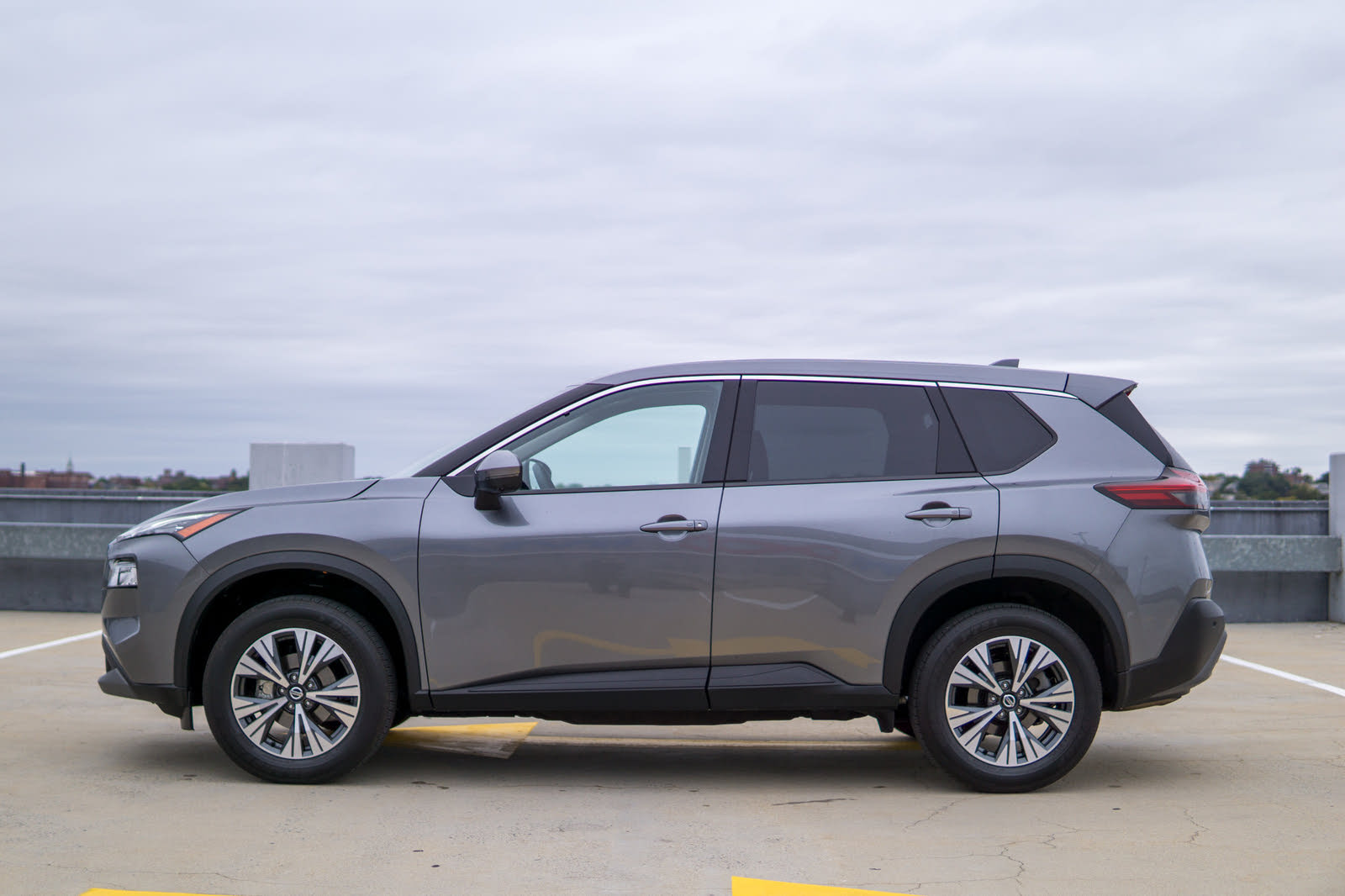
According to CarGurus experts, the overall rating for the 2020 Toyota 4Runner was 6.8 out of 10, while the 2021 Nissan Rogue scored 9.0 out of 10. Based on these ratings, the final recommendation leans towards the 2021 Nissan Rogue. Its superior ratings reflect its modern design, technological advancements, enhanced safety features, and better overall functionality, making it the more comprehensive choice for the modern consumer seeking a reliable, comfortable, and tech-savvy SUV.
Choose the 2021 Nissan Rogue if:
Shop Now- You seek a modern, family-friendly SUV with advanced safety features and a comprehensive ADAS suite.
- You value a comfortable and spacious interior with high-quality materials and trim options.
- You prioritize technology and infotainment systems that are up-to-date and user-friendly.
Choose the 2020 Toyota 4Runner if:
Shop Now- You prioritize rugged off-road capability and durability in all driving conditions.
- You require a vehicle with a higher towing capacity for your adventures (up to 5,000 pounds).
- You prefer a classic, utilitarian SUV design and build.

By: CarGurus + AI
At CarGurus, our team of experienced automotive writers remain at the heart of our content operation, conducting hands-on car tests and writing insightful guides that are backed by years of industry experience. To complement this, we are harnessing AI to make our content offering more diverse and more helpful to shoppers than ever. To achieve this, our AI systems are based exclusively on CarGurus content, ratings and data, so that what we produce is both unique to CarGurus, and uniquely helpful to car shoppers.






















